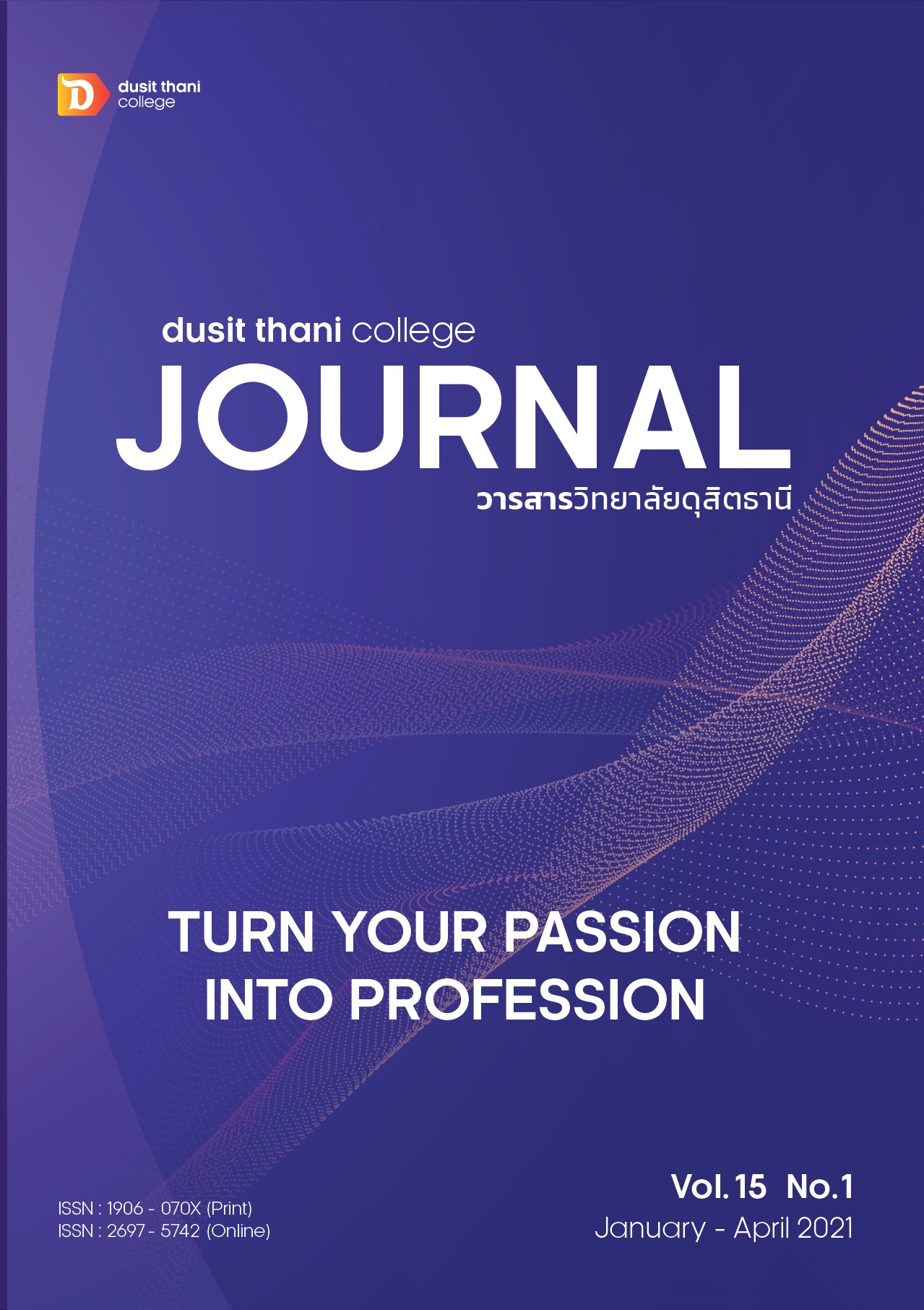TOURIST’S PERCEPTION OF BUFFET’S FOOD WASTE IN HOTELS IN BANGKOK
Main Article Content
Abstract
Food waste is a global phenomenon according to its consequences upon sustainability, which is considered as an inevitable spike of the hospitality industry especially in hotel’s buffets. This descriptive study aims to find the awareness and contemporary thinking of tourists upon the food waste problems in Thailand including the motives and perception influencing tourists to eat at a hotel’s buffet in relation to food waste. Furthermore, description of food service providers concerns and food waste management in the properties in relation to the government’s campaigns and guidelines. This study deployed mixed methods of in-depth and semi-structured interviews, focused group discussion, personal observations and survey questionnaires, of which all data is analyzed by utilizing content analysis, color-coding and constant comparison analysis methods. The objectives of study were 1) to measure the degree of awareness and contemporary thinking amongst tourists regarding food waste from the hotel’s buffet in Bangkok, 2) to understand the main motivations and perception that influence tourists travelling in Bangkok to have buffet in relation to food waste be in clustered, 3) to explore the food service providers’ concern towards food waste problems in relation to government’s campaigns, and 4) to find out the ways to manage the food waste of the food service providers with governmental supportive guidelines upon the leftovers. The results reflected that awareness of domestic tourists is low compared to international tourists, whilst the top three motivating factors arousing tourists to visit hotel’s buffet are special occasion, value of money, taste and quality, and variety of food offered. Secondly, perception of tourists towards food products, service and dining experience were all mentioned including buffet’s promotion. For the hoteliers, the concern of general waste is more consider rather than food waste. The policy of food waste minimization has not been passed down to the operational staff and receives less support from government. The hoteliers have also faced a great challenge of value and expectation of the tourists seeking for full function of food service while payment has been made. Thus, additional practices of live cooking, food donation and giveaway, and waste sorting were suggested to be more practical.
Article Details
Article Screening Policy
- All research and academic articles to be published must be considered and screened by three peer reviews in the relevant field / article.
- All articles, texts, illustrations and tables published in the journal are the personal opinions of the authors. Editors don't always have to agree. And no responsibility whatsoever is the sole responsibility of the author.
- The articles to be published must never be published. Where did you first publish? And not in the consideration of other journals If the audit found that there has been a duplicate publication It is the sole responsibility of the author.
- Any article that the reader sees as being plagiarized or impersonated without reference. Or mislead the work of the author Please let the journal editor know it will be your greatest blessing.
References
Bravi, L., Murmura, F., Savelli, E., & Viganò, E. (2019). Motivations and Actions to Prevent Food Waste among Young Italian Consumers. Sustainability. MDPI. Open Access Journal, 11(4), pages 1-23, February.
Henderson, J. C. (2009). Food tourism reviewed. British Food Journal, 111(4), 317-326
Hyland, P. (2020, January 13). Food Waste: Should the Tourism Industry Worry?. Tourism-review. Retrieved January 25, 2020 from https://www.tourism-review.com/tourism-industry-fighting-the-food-waste-news11341
Juvan, E., Grün, B., & Dolnicar, S. (2018). Biting Off More Than They Can Chew: Food Waste at Hotel Breakfast Buffets. Journal of Travel Research, 57(2), 232–242. https://doi.org/10.1177/0047287516688321
J.A. Rudmi Chehanika Sandaruwani, W.K. Athula C. Gnanapala. (2016). Food Wastage and its Impacts on Sustainable Business Operations: A Study on Sri Lankan Tourist Hotels. Procedia Food Science. Volume 6, 2016. Pages 133-135.
Kuo, C., Shih, Y. (2016). Gender Differences in the Effects of Education and Coercion on Reducing Buffet Plate Waste. Journal of Foodservice Business Research 19 (3): 223–35.
Mohd Zahari, Mohd Salehuddin & Hanafiah, Mohd & md zain, nur adilah. (2018). Food and Tourism Destination Image: Moderating Effect of Local Food Consumption. e-Review of Tourism Research. 15.
Pacific Asia Travel Association. (n.d.). PATA x Thai-SOS – the food waste agenda in Thailand. Pacific Asia Travel Association. Sustainability & Social Responsibility. Retrieved on January 24, 2020, from https://sustain.pata.org/pata-x-thai-sos-the-food-waste-agenda-in-thailand/
Wang, L. E., Liu, G., Liu, X., Liu, Y., Gao, J., Zhou, B., ... & Cheng, S. (2017). The weight of unfinished plate: A survey based characterization of restaurant food waste in Chinese cities. Waste Management, 66, 3-12.
Wansink, B. (2004). Environmental Factors That Increase the Food Intake and Consumption Volume of Unknowing Consumers. Annual review of nutrition. 24. 455-79. 10.1146/annurev.nutr.24.012003.132140
Wilkins, H., Merrilees, B., Herington, C. (2007). Towards an Understanding of Total Service Quality in Hotels. Hospitality Management 26 (4): 840–53.)


